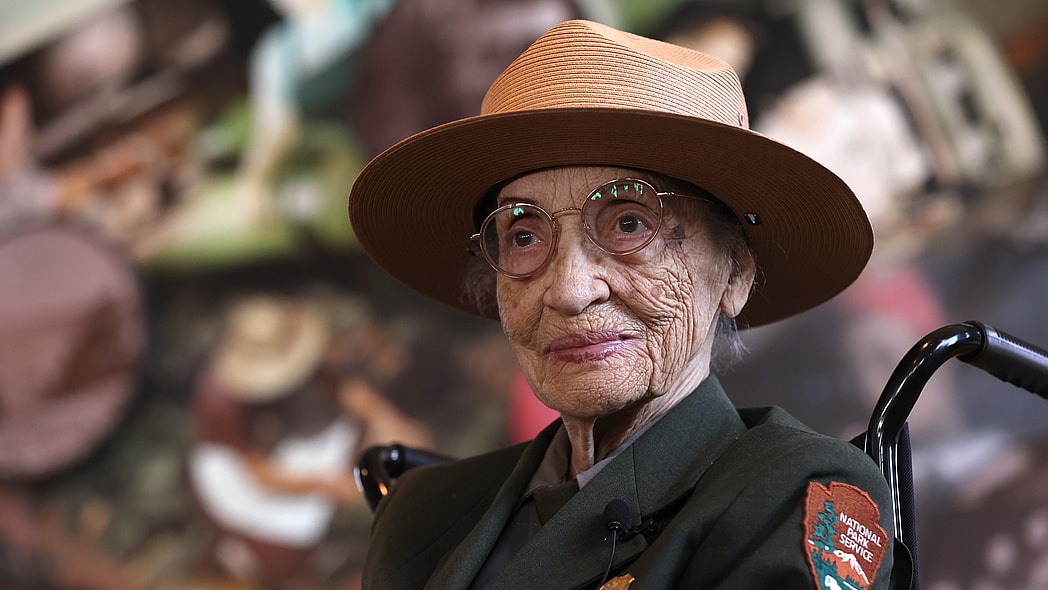SPRINGFIELD, Ill. (AP) — Two emergency response calls were made from the home of Sonya Massey, the Black woman who was shot in the face by an Illinois sheriff’s deputy after she called 911 for help, in the days leading up to her death, according to records released Wednesday.
In a third call, Massey’s mother, Donna Massey, reports that her daughter is suffering a “mental breakdown” and tells the dispatcher, “I don’t want you guys to hurt her.” She adds that she fears the police and asks that no officer who is “prejudiced” be sent.
In the other calls, a woman calling from Sonya Massey’s address, who doesn’t identify herself, says people want to hurt her, and a day later, a woman identifying herself as Sonya Massey reports a neighbor had hit her with a brick.
The Sangamon County Sheriff’s Department is still trying to determine whether Massey’s history of mental health issues was relayed to deputies responding to the call about a suspected prowler, which ended in her death on July 6.
Former sheriff’s deputy Sean Grayson, 30, who is white, is charged with first-degree murder, aggravated battery with a firearm and official misconduct in the shooting death of Massey, 36, in her home. He has pleaded not guilty and is being held without bond.
Also Wednesday, Sheriff Jack Campbell released Grayson’s personnel file in response to public-records requests, with records leading up to his May 1, 2023, hire to his dismissal July 17, the day he was indicted. It confirms what was previously known, that Campbell was aware of Grayson’s two drunken driving convictions within a year, the first of which led to his premature discharge from the Army.
Campbell said DUIs do not disqualify a candidate and that Grayson’s rapid succession of jobs — five in four years before joining the Sangamon department — showed admirable ambition to advance to larger and more structured departments. The sheriff said he knew of no previous discipline problems. References indicating Grayson needed more training are common for young recruits, and Grayson subsequently attended 16 weeks of academy training, Campbell said.
Grayson’s March 31, 2023, psychological evaluation found him fit to serve but noted, “He knows he can move too fast at times. He needs to slow down to make good decisions.”
Body camera video shows that after checking yards around the home just before 1 a.m. July 6, Massey greeted the deputies at the front door with, “Don’t hurt me,” appeared confused and repeated, “Please, God.” Inside her home, on the southeast side of Springfield, she had trouble finding her ID and asked for her Bible.
Following Grayson’s direction to remove a pot of water from the stove, she unexpectedly said, “I rebuke you in the name of Jesus.” Grayson then pulled his gun and yelled at her to drop the presumably hot water before firing three times, striking her below the left eye.
The personnel file includes the results of the internal investigation that led to Grayson’s dismissal, indicating that he violated rules on use of force and standards of conduct, failed to turn on his body camera or to provide medical aid and insubordination for refusing to answer questions during the investigation’s interview even after a superior ordered him to.
“Grayson immediately escalated to deadly force based on the decedent stating, ‘I rebuke you in the name of Jesus,’” Chief Deputy Anthony Mayfield wrote. “When Deputy Grayson pointed his firearm at the decedent, she was not making any aggressive movements, only talking.”
Grayson’s failure to “attempt non-violent strategies and techniques” or to communicate led to Massey’s death, Mayfield said.
Family members have said Massey struggled with mental health issues and had undergone treatment. Her son, Malachi Hill Massey, said last week that his mother sent him and his sister to live with their fathers the first week of July because she had checked herself into a 30-day inpatient treatment program, then returned two days later.
Shortly before 9:30 p.m. July 4, a 911 caller from Massey’s address said, “Somebody’s trying to hurt me.” When the dispatcher asked who, she said, “A lot of them.” Pressed for more information, she said, “Never mind. This must not be the right number,” and disconnected. When called back, she said she no longer needed police. Wilhite said officials do not know if it was Massey who called.
The next morning, just after 9 a.m., Donna Massey called saying her daughter was outside the house and yelling. She said Sonya Massey is not a danger to anyone, but “When she gets upset, she thinks everybody’s after her, like paranoid-schizophrenic.”
She told the dispatcher she fears the police and didn’t want her daughter to be hurt.
“Please don’t send no combative policemen that are prejudiced,” Donna Massey said.
Recommended Stories
Springfield police, who took the call, reported that Massey did not want to talk to medical professionals but was checked by emergency medical technicians who “cleared” her.
Sonya Massey called a few hours later to report a neighbor had hit her with a brick. A sheriff’s deputy caught up to her at a hospital, where the dispatch record said she went “to seek treatment of her mental state.” She told the officer the neighbor used a brick to break her SUV’s window and that she herself broke another “in an attempt to get into the car to get away.”
The deputy noted Massey appeared to be having mental health problems and was seeking treatment for scrapes she sustained reaching through the broken glass. She told the officer she had recently been released from a mental health facility and claimed that earlier that day “she was out with” police “who attempted to run her off the road.”
The officer said Massey also had paperwork from a July 3 interaction with a mental health mobile crisis unit from another Springfield hospital.
Twelve hours later, when Grayson and the second deputy responded to the July 6 call and were searching her yard, body camera video indicates they notice the broken windows on the SUV and ask Massey if it is hers, which she denies.










